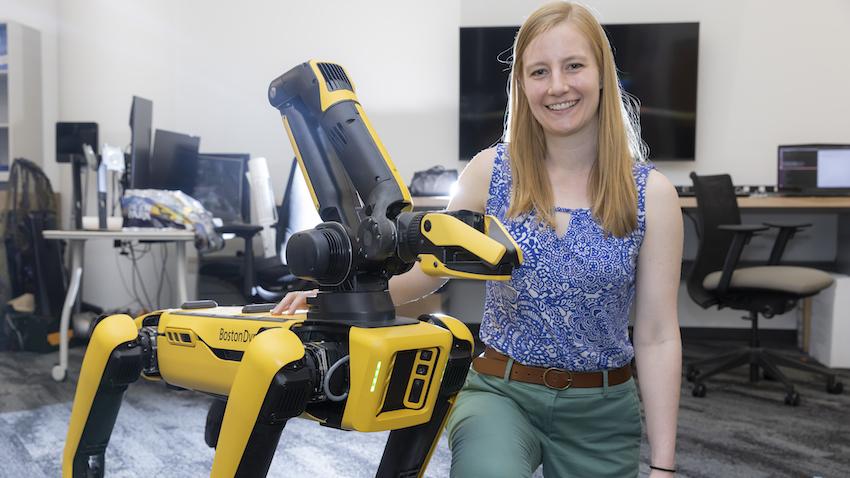
New PEO Scholar Continues Quest to Build Assistive, Customizable Robots
For Erin Botti, the field of human-robot interaction (HRI) provided the answer to what she wanted to do with her life.
Her father was an engineer, and her mother was a psychologist. She was interested in both.
“I realized there was this whole field of human-robot interaction, which combines those two fields,” Botti said. “I get to code the robot and write algorithms and I also get to run human-subject experiments and analyze how people feel about the robot.”
It isn’t the dynamics and intricacies of robotics that drives Botti as much as the human element that HRI explores.
“When I tell people I work with robotics, they ask if I’m working on Terminator,” she said. “I’m trying to do the opposite — building robots that are helpful and customizable.”
Botti, a fourth-year Ph.D. student under the advisement of Interactive Computing Assistant Professor Matthew Gombolay, recently received the P.E.O. Sisterhood’s Scholar Award. The merit-based award is given to women pursuing doctoral-level degrees and comes with a $20,000 scholarship.
The P.E.O. Sisterhood is an educational organization founded in 1869 dedicated to the advancement of women in higher education with more than 6,000 local chapters in North America and about 250,000 active members.
“It’s nice to be honored,” Botti said. “I wasn’t really expecting it. It can help me go to more conferences that I wouldn’t necessarily be able to attend otherwise. A lot of my time here was during Covid, so we didn’t get to travel much. It’ll be nice to broaden my network and see other types of research.”
The bulk of Botti’s research has focused on training robots through human demonstration, also known as Learning from Demonstration (LfD).
Botti received a best paper award in 2022 from the International Conference on Human-Robot Interaction for co-authoring “MIND MELD: Personalized Meta-Learning for Robot-Centric Imitation Learning.” The paper explores robots designed to be taught by everyday people and how the robot can learn correctly if users lack the expertise to teach them.

“People can be suboptimal when giving demonstrations because they may not understand the robot or there may be a correspondence problem,” Botti said. “Maybe your arm is different from the robot’s arm, and when you perform the motion, it may not work as well. People can also take shortcuts that the robot should not follow. And people are heterogenous. The way I would show the robot to do something is different from the way someone else would.
“We developed an algorithm that learns from suboptimal and heterogenous demonstrators. It uses personalized embedding that describes how a person is suboptimal, and then we can use that embedding to learn how to correct their demonstrations and shift them to be better.”
Botti also co-authored a paper that was accepted to the 2022 Conference on Robotic Learning (CoRL), which expanded upon her research in the HRI paper as to how robots can provide feedback to their human trainers.
Botti is now researching how to develop in-home robot assistant for the older adults that can perform daily chores, such as loading a dishwasher, and adapt to user preferences.
“Erin is on the cusp of putting robots in the hands of regular people in their homes to learn and perform assistive tasks and validating decades of research in robotics,” Gombolay said. “Her unique focus on robotic assistance for the elderly will have significant broader impacts on society. She is bright, inquisitive, savvy, and fearless, and this award will help her leverage those assets to change the world of robotics.”


